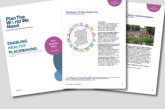 Cheryl Hiles, Energy and Environment Sector Director at Pell Frischmann, offers advice on planning for a smart energy future.
Cheryl Hiles, Energy and Environment Sector Director at Pell Frischmann, offers advice on planning for a smart energy future.
Hidden amongst the torrent of political activity this summer, the Government committed to halting the UK’s contribution to climate change by 2050. This commitment will have significant implications that the Government and planners must now work to get right.
It is positive that many authorities are declaring ‘Climate Emergency’ — a powerful statement of intent. What happens next, however, will make the biggest difference. It is within this context that the Royal Town Planning Institute (RTPI) South West has shone a valuable spotlight on the role of planning as a key facilitator in delivering a cornerstone of this agenda — a smart energy system.
Smart energy is fundamental to decarbonising our economy cost effectively. The RTPI South West’s national research, published on 18th July 2019, drew heavily on the experience of planning professionals from local authorities — especially in the south west of England. This research recognised significant strides have been made to support lower emissions, but that the action to-date and existing planning tools only take us part of the way.
The report acknowledges the important role of every planning professional in helping make the transition to a smart energy system the foundation of energy policy in the UK. It calls on the Government to recognise the need for smart energy to be at the core of planning for new homes, jobs, transport and infrastructure, and to invest in planning authorities to achieve that.
There is already a legal duty and policy imperative on local planning authorities to take a proactive approach to mitigating and adapting to climate change, but the research found other pressures sometimes mean this is not prioritised. To overcome that we need a reinvigorated emphasis on emissions reduction and planning’s contribution.
Whole systems approach
The research has shown that local planning authorities have the greatest impact when they take a whole systems approach to planning for smart energy. Local areas that successfully undertake whole system energy planning with their Distribution Network Operators (DNOs), businesses, local communities and other stakeholders can create an environment where initiatives have community support, projects are deliverable, and a positive planning environment supports the development of locally appropriate and fully integrated smart energy systems.
Embedding smart energy objectives, not only throughout planning but also across a wide variety of functions of the local authority, has proved to be highly effective. Collaboration between local authority departments and with business, communities and DNOs can unlock important evidence and resources. It will also support the development of innovative business models based on smart technology. This enables viability barriers to be overcome and locally appropriate solutions to be delivered.
This means local authorities have a particularly important part to play given their role in setting policies for future placemaking. To meet our Net Zero obligations by 2050, our homes, businesses, transport and energy systems all need to be completely decarbonised. Retrofitting is always more costly than designing efficiently and appropriately in the first place, so it is important that local authority planners act soon to establish what is right for their communities and plan for this now rather than risk more intrusive and more expensive action later.
The RTPI ‘Planning for a Smart Energy Future’ report recommends that local planning authorities and those new combined authorities with plan-making powers, should urgently review their approach to ensure their policies and actions support smart energy as part of delivering a zero-carbon future.
Technologies and infrastructure are changing rapidly but so also are the ways in which people will access energy and mobility services. This research urges the Government to consider how spatial planning can help reduce emissions and harness the business benefits that will be generated from transition to a zero-carbon economy. It makes no sense, economically, socially or environmentally, to continue to plan and deliver new homes, buildings and infrastructure today that will require costly retrofitting tomorrow.
Article written on behalf of the RTPI SW Planning for Smart Energy Project Team
For a copy of the Planning for a Smart Energy future visit https://www.rtpi.org.uk/smartenergy









